|
|
|
Sort Order |
|
|
|
Items / Page
|
|
|
|
|
|
|
| Srl | Item |
| 1 |
ID:
133220


|
|
|
|
|
| Publication |
2014.
|
| Summary/Abstract |
THE RECENT LITERATURE ON CIVIL WARS IS WIDE and deep; a number of major studies compel us to rethink what we know about this important subject. One of the areas that has eluded concerted scholarly attention has been the question of how national armies can be developed that satisfy the imperatives of post-civil war reconciliation and democratic consolidation. This issue is at the center of this article.
Civil wars are fought for different reasons in very different settings and are resolved differently. Nevertheless, it is possible to draw valuable lessons of building national armies from even highly disparate attempts in very different post-civil war environments. The principal goal of this article is to highlight, through their contrasting achievements and shortcomings, lessons we can learn from three cases.
|
|
|
|
|
|
|
|
|
|
|
|
|
|
|
|
| 2 |
ID:
079509
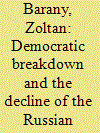

|
|
|
|
|
| Publication |
Princeton, Princeton University Press, 2007.
|
| Description |
ix, 246p.
|
| Standard Number |
9780691128962
|
|
|
|
|
|
|
|
|
|
|
|
Copies: C:1/I:0,R:0,Q:0
Circulation
| Accession# | Call# | Current Location | Status | Policy | Location |
| 052884 | 322.50947/BAR 052884 | Main | On Shelf | General | |
|
|
|
|
| 3 |
ID:
106768
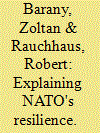

|
|
|
|
|
| Publication |
2011.
|
| Summary/Abstract |
Over the past two decades, NATO's membership and mission have expanded. Practitioners and scholars have extensively debated the pros and cons of the changes, but few have sought to explain why the alliance is so resilient. This paper directly asks and answers the question: Why has NATO mission and membership expanded since the end of the Cold War? Three leading approaches of international relations are used to answer this question. The empirical analysis finds that in isolation, none of the theories perform well at predicting or explaining NATO's adaptation to the post-Cold War environment. However, when combined, they do offer a coherent explanation for the alliance's enlargement and the development of out-of-area operations.
|
|
|
|
|
|
|
|
|
|
|
|
|
|
|
|
| 4 |
ID:
048221
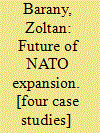

|
|
|
|
|
| Publication |
Cambridge, Cambridge University Press, 2003.
|
| Description |
x, 267p.
|
| Standard Number |
052182169X
|
|
|
|
|
|
|
|
|
|
|
|
Copies: C:1/I:0,R:0,Q:0
Circulation
| Accession# | Call# | Current Location | Status | Policy | Location |
| 047206 | 355.031091821/BAR 047206 | Main | On Shelf | General | |
|
|
|
|
| 5 |
ID:
176572
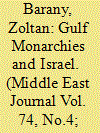

|
|
|
|
|
| Summary/Abstract |
The relationship between most of the Gulf monarchies and Israel has improved in recent years. This article argues that four fundamental reasons account for the shift in Gulf leaders' attitudes: growing alignment of geopolitical interests against Iran, failings of American Middle East policy, recognition of the potential economic benefits of détente, and attitudinal shifts about the Palestinian cause. While this trend is present nearly throughout the Gulf, individual states' evolving nexuses to Israel underscore the divergences in their foreign policies.
|
|
|
|
|
|
|
|
|
|
|
|
|
|
|
|
| 6 |
ID:
134244
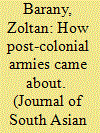

|
|
|
|
|
| Summary/Abstract |
The creation of an army loyal to the state is one of the most important institutional tasks of post-colonial leaders. But how do novice political leaders develop the capacity to subordinate the armed forces to the authority of state institutions? This essay explains alternative methods of formulating post-colonial civil–military relations and explains why four states – India, Pakistan, Ghana, and Tanzania – took such different routes of institutional development. I make two arguments. Firstly, building armed forces that willingly acquiesce to state authority is always a critical issue of regime change – whether to democracy or some other form of government – though it is more difficult to accomplish in some contexts than others. Secondly, the political and socioeconomic contexts in which armies must be built are very different and thus pose dissimilar challenges and tasks to those crafting new armies and civil–military relations. I will assess the power of several variables to explain the disparate outcomes of the four cases: the quality of political leadership and leaders’ approach to the armed forces, the strength of political institutions, ethno-religious and regional policies, civilian control mechanisms, military–societal relations, and foreign influence.
|
|
|
|
|
|
|
|
|
|
|
|
|
|
|
|
| 7 |
ID:
076146
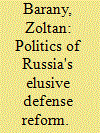

|
|
|
| 8 |
ID:
124238
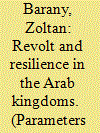

|
|
|
|
|
| Publication |
2013.
|
| Summary/Abstract |
The eight Arab kingdoms, aside from Bahrain, have weathered the Arab Spring with remarkable ease when compared to presidential republics. What explains the relatively modest upheaval and the ruling elites' success in preserving the status quo? This article suggests that the popular legitimacy of the region's monarchies complemented by fragmented political opposition and deep social cleavages limited the appeal of radical revolt.
|
|
|
|
|
|
|
|
|
|
|
|
|
|
|
|
| 9 |
ID:
163849
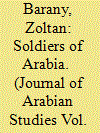

|
|
|
|
|
| Summary/Abstract |
Since the 1960s many democracies and prosperous authoritarian states have abolished national military service but in recent years that trend has been reversed in several European states — owing primarily to the changing security environment — and, more surprisingly, in Arabia. Three Gulf Cooperation Council states, Kuwait, Qatar, and the United Arab Emirates recently introduced conscription for their armed forces. Although this development may be explained in part by emerging external security challenges, this paper argues that the primary explanatory factors are intraneous: socioeconomic reasons, military-strategic motives, and political considerations. The article contends that the most important objective of the Gulf governments that introduced conscription is nation-building, that is, to deepen the relationship between citizens and the state.
|
|
|
|
|
|
|
|
|
|
|
|
|
|
|
|
| 10 |
ID:
120903
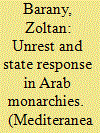

|
|
|
|
|
| Publication |
2013.
|
| Summary/Abstract |
The turmoil associated with the Arab Spring in the region's eight monarchies has received comparatively modest attention because, aside from Bahrain, the demonstrations were mostly small and nonconfrontational, there were few calls to overthrow the regimes, and states' coercive powers were applied with relative moderation. Behind these generalizations, however, lies a more complex reality: the extent of the strife was quite different, as were state actions to counter them across the eight cases. What explains these disparities? This essay argues that the differences in the levels of unrest are largely illuminated by varying degrees of societal support for monarchical regimes, deep-seated societal cleavages, and the deficiencies of political mobilization. The variation in state responses, in turn, is mainly explained by divergent financial resources, the quality of political leadership, and external diplomatic, financial, and security assistance.
|
|
|
|
|
|
|
|
|
|
|
|
|
|
|
|
| 11 |
ID:
158875
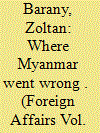

|
|
|
|
|
| Summary/Abstract |
Late last year, when news broke that Myanmar’s military had been systematically killing members of the country’s Muslim Rohingya minority [1], much of the world was shocked. In recent years, Myanmar (also known as Burma) had been mostly a good news story. After decades of brutal dominance by the military, the country had seen the main opposition party, the National League for Democracy, score an all-too-rare democratic triumph [2], winning the 2015 national elections in a landslide. The NLD’s leader, Aung San Suu Kyi, an internationally celebrated dissident who had received the 1991 Nobel Peace Prize for her efforts to democratize Myanmar, became Myanmar’s de facto head of state. Many analysts and officials concluded that the county was finally on the path to democratic rule. Support poured in from Western democracies, including the United States. Myanmar had long been isolated, relying almost exclusively on China, which was content to turn a blind eye to human rights abuses. Now, many hoped, Suu Kyi [3] would lead the country into the Western-backed international order.
|
|
|
|
|
|
|
|
|
|
|
|
|
|
|
|
| 12 |
ID:
167911
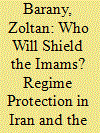

|
|
|
|
|
| Summary/Abstract |
The Iranian protest wave in the summer of 2018 and the ongoing sporadic strikes have been persistent reminders of the importance of regime protection. Since the establishment of the Islamic Republic in 1979, Iran has not been free of societal upheavals although they never posed a serious threat to the regime's survival. That they did not can be explained by the opposition's shortcomings and, more convincingly, the unhesitating and brutal crackdown of the regime's security forces. Still, not all parts of Iran's coercive apparatus are equally devoted to the imams' conservative rule. Under what conditions would military forces split from the government? What useful lessons can be drawn from Iran's own history and the examples of the Arab Spring upheavals?
|
|
|
|
|
|
|
|
|
|
|
|
|
|
|
|
| 13 |
ID:
158301
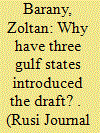

|
|
|
|
|
| Summary/Abstract |
Kuwait, the UAE and Qatar have introduced conscription for their armed forces. Zoltan Barany examines the factors that have influenced this decision. He shows that the policy is designed to support the emerging security needs of these states while at the same time helping to strengthen the link between state and citizen.
|
|
|
|
|
|
|
|
|
|
|
|
|
|
|
|
| 14 |
ID:
090229
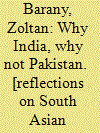

|
|
|
|
|
| Publication |
New Delhi, Centre for Land Warfare Studies, 2009.
|
| Description |
31p.
|
| Series |
Manekshaw paper; no.11
|
|
|
|
|
|
|
|
|
|
|
|
Copies: C:1/I:0,R:0,Q:0
Circulation
| Accession# | Call# | Current Location | Status | Policy | Location |
| 054363 | 355.033559/BAR 054363 | Main | On Shelf | General | |
|
|
|
|
|
|
|
|
|